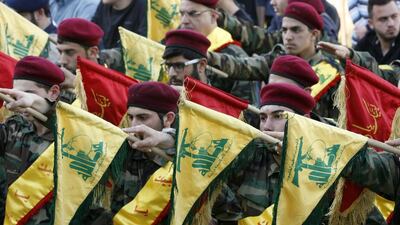Last week, Israel’s defence minister, Avigdor Lieberman, told his soldiers that the Lebanese army was an integral part of Hizbollah, and that in any future war Israel would probably have to fight both. Mr Lieberman’s remarks were overly simplistic, but if Israel adopts such an attitude, its behaviour will lead to the very outcome the minister was warning against.
It's undeniable that the Lebanese army and Hizbollah frequently coordinate their actions, if only because of the political influence enjoyed by the party in Lebanon and the fact that the army has no option of confronting the party militarily without risking a civil war. This situation is not normal, certainly, but nor does it mean the army is Hizbollah's tool. Both are immovable objects in Lebanese society. And if Israel and Lebanon are at war, yes the army would fight back. That's what armies do.
There is the growing tendency among some groups in Israel and the United States to conflate the army and Hizbollah, in such a way as to assume that they are indistinguishable. This not only is devoid of nuance, it helps justify a particular Israeli reaction in a possible war. It will also undermine and neutralise any opposition to Hizbollah in Lebanon.
Assuming that the army is "a part of Hizbollah" is simply inaccurate. Such a view fails to take into consideration that the military is a complex institution, made up many sects and interest groups, some with Hizbollah, some against, and some that mainly benefit from the status quo. Like Lebanon itself, the army is a "house of many mansions" that cannot be shoehorned into simpleminded interpretative catchphrases.
_________________
Read more from Michael Young
Moderate Hariri faces economic problems and political obstacles
Far beyond the nuclear deal, a broader regional plan is needed to contain Iran
_________________
For example, a significant portion of the military’s rank and file is Sunni. While the tendency is to focus on the officer corps, any command decision taken at the top must factor in whether soldiers at the lower levels will willingly implement them. Given widespread Sunni hostility to Hizbollah, to try to tie the army tightly to the party’s choices is not something pro-Hizbollah officers can do without carefully measuring the risks.
The effort to conflate the army and Hizbollah is also worrisome because it, essentially, aims to justify massive retaliation against Lebanon in the event of a forthcoming war. This is the so-called "Dahieh Doctrine" that Israel developed after the 2006 war in Lebanon. It holds that any future conflict would lead to massive Israeli destruction of Lebanon's infrastructure, much as it did to the southern suburbs of Beirut in 2006.
By insisting the Lebanese army and Hizbollah are one, Israel is effectively saying that the Lebanese state and Hizbollah are one. This implies that Israel’s destruction of Lebanon would be regarded as legitimate. Mr Lieberman’s statement was in part designed to deter Hizbollah, by warning the party that it would have to take responsibility for any new war. But it was also a rationale for possibly killing thousands of innocent civilians and engaging in destruction exacerbating national misery.
Perhaps the greatest problem in the assumption that the Lebanese army and state are as one with Hizbollah is that it ignores all those Lebanese who actually oppose the party. It is fair to say that they constitute a majority in the country, albeit a helpless one, as they have no guns. However, by peddling a simplistic narrative suggesting that the Lebanese state is a branch of Hizbollah, those who hold such a view only discredit the state, strengthening Hizbollah in relative terms, while undermining any backlash against the party following a possible war.
___________________
Read more from Opinion
South Sudan – a tragedy forgotten
Male entitlement is a universal sickness
In the battle against fake news, we can learn from the war on drugs
___________________
Why is that? Because such an accusation creates an “either-or” scenario leaving no third way. Since the Lebanese and their state cannot be on Israel’s side, they must necessarily be Hizbollah’s accomplices, meriting whatever punishment they receive. The vast majority of Lebanese who want no war, but also have no real ability to prevent it, are dismissed in this version. It is astonishing that those holding such a view cannot see that this only plays into Hizbollah’s hands.
Moreover, Israel’s widespread destruction of Lebanon would leave no room for dissent. Hizbollah will insist that unity and solidarity are the only acceptable responses to such vengefulness. Few Lebanese will be able to disagree, particularly if the Israelis target the army, which enjoys much support in the country, as well as civilian infrastructure. All this would only help impose Hizbollah's version of events.
Gaza provides a good example. In 2014 Israel also engaged in massive retaliation against the territory to end Hamas's rocket fire, destroying or damaging not far from 100,000 homes, according to the United Nations Relief and Works Agency for Palestine Refugees in the Near East. Yet this hardly dented Hamas's control. Nor is such behaviour likely to weaken that of Hizbollah, which answers to Tehran not Beirut.
Neither Israel nor the United States will take any of this into account if war breaks out in Lebanon. A conflict will quickly escalate to the highest levels of violence. As in countless previous wars, it will only bolster the most hard-line elements. The problem is that the big losers in Lebanon will be state institutions as well as those in society who have no sympathy for Hizbollah. How the party would suffer from such a situation is a mystery. But Mr Lieberman needs to provide an answer.


